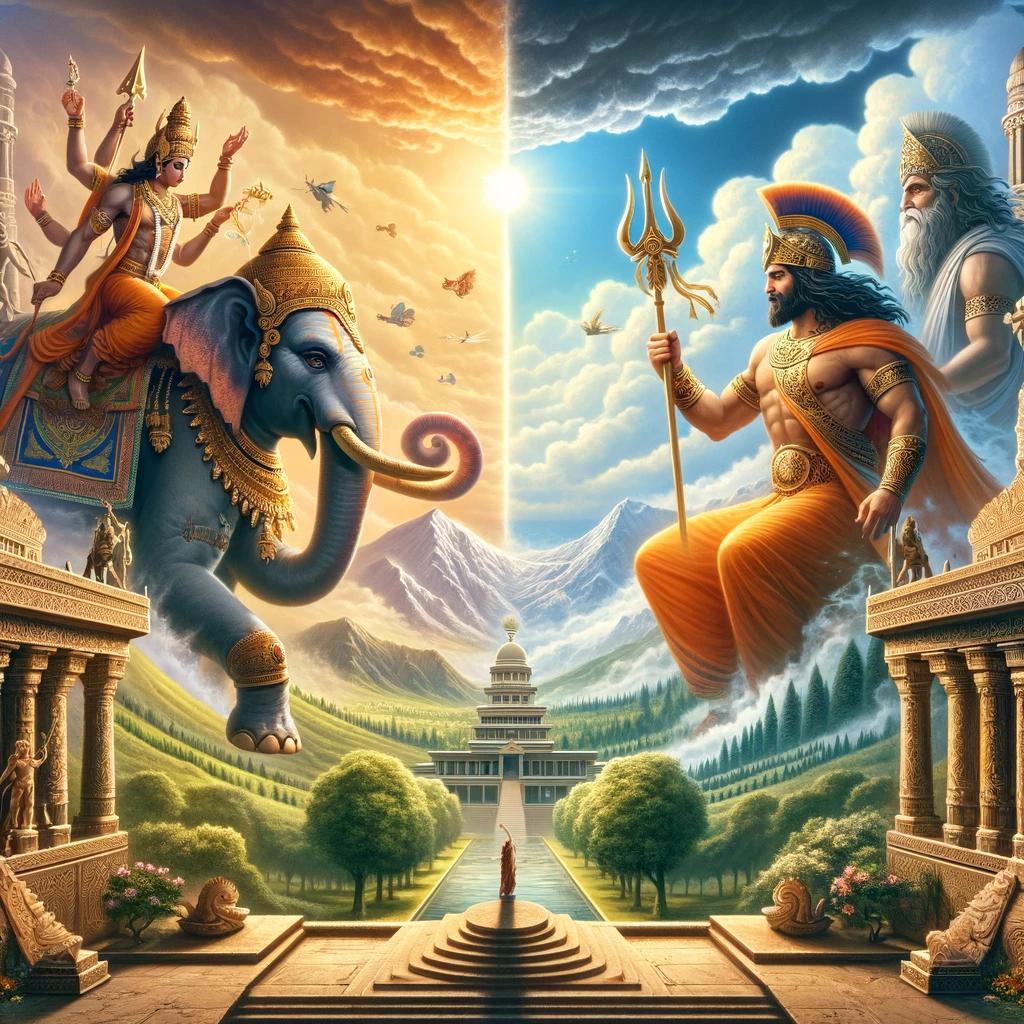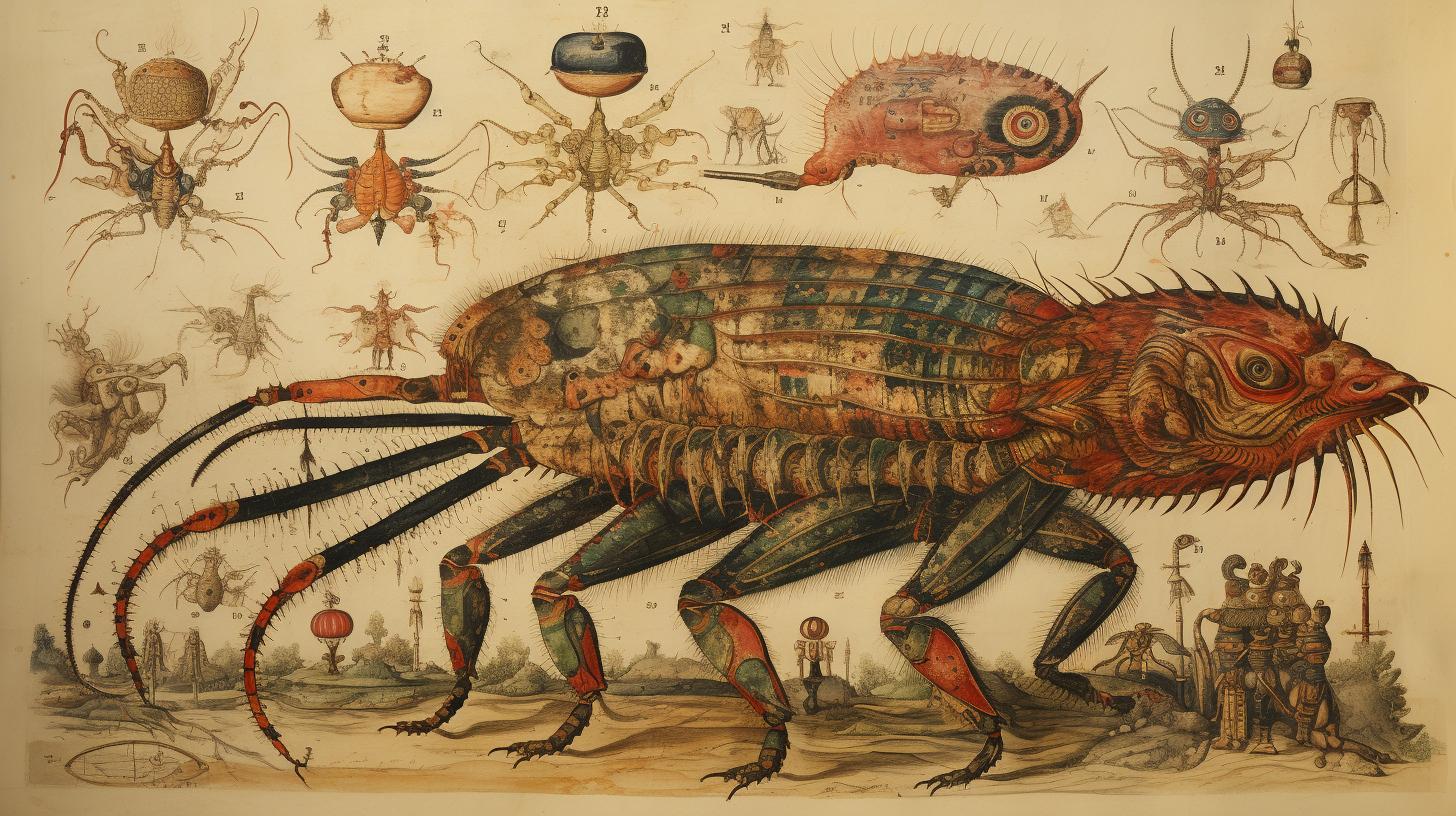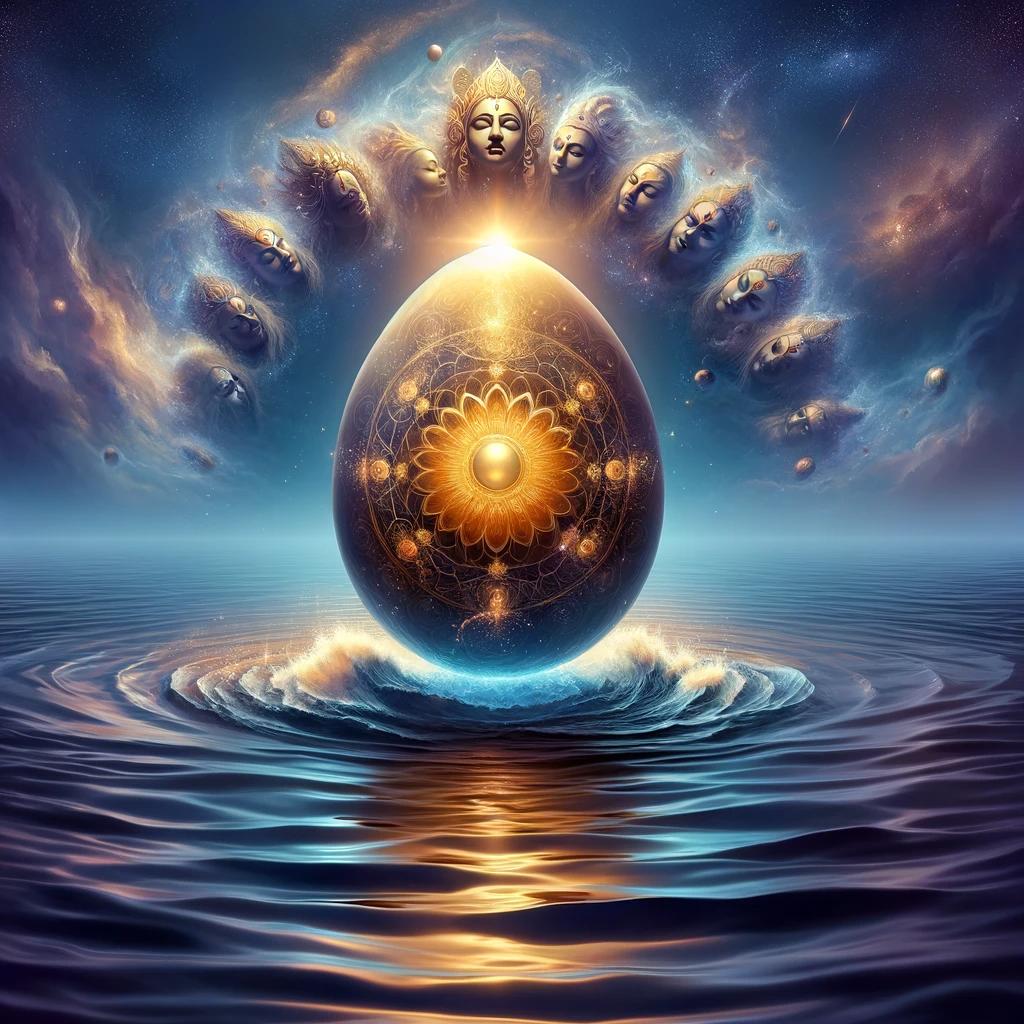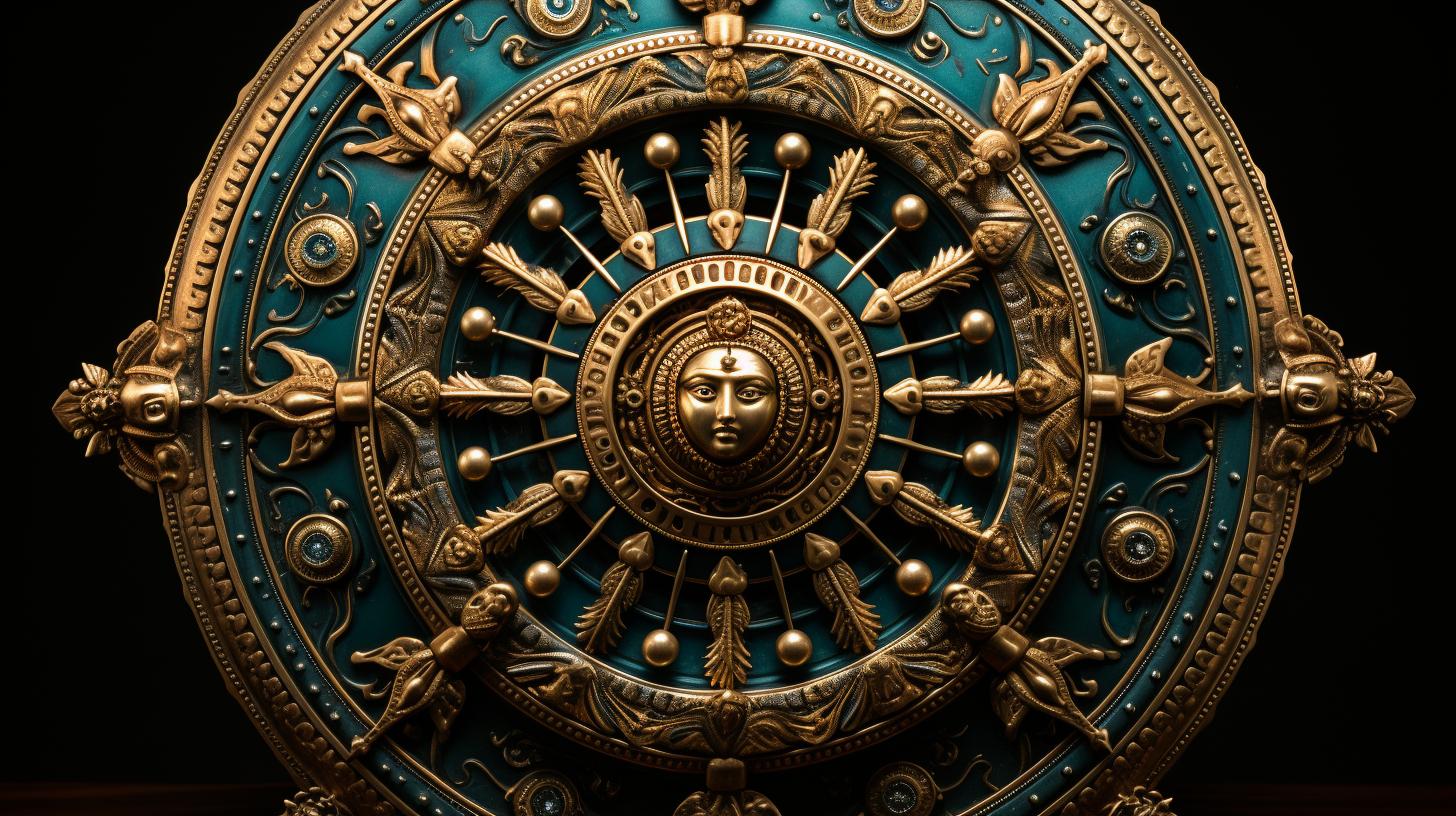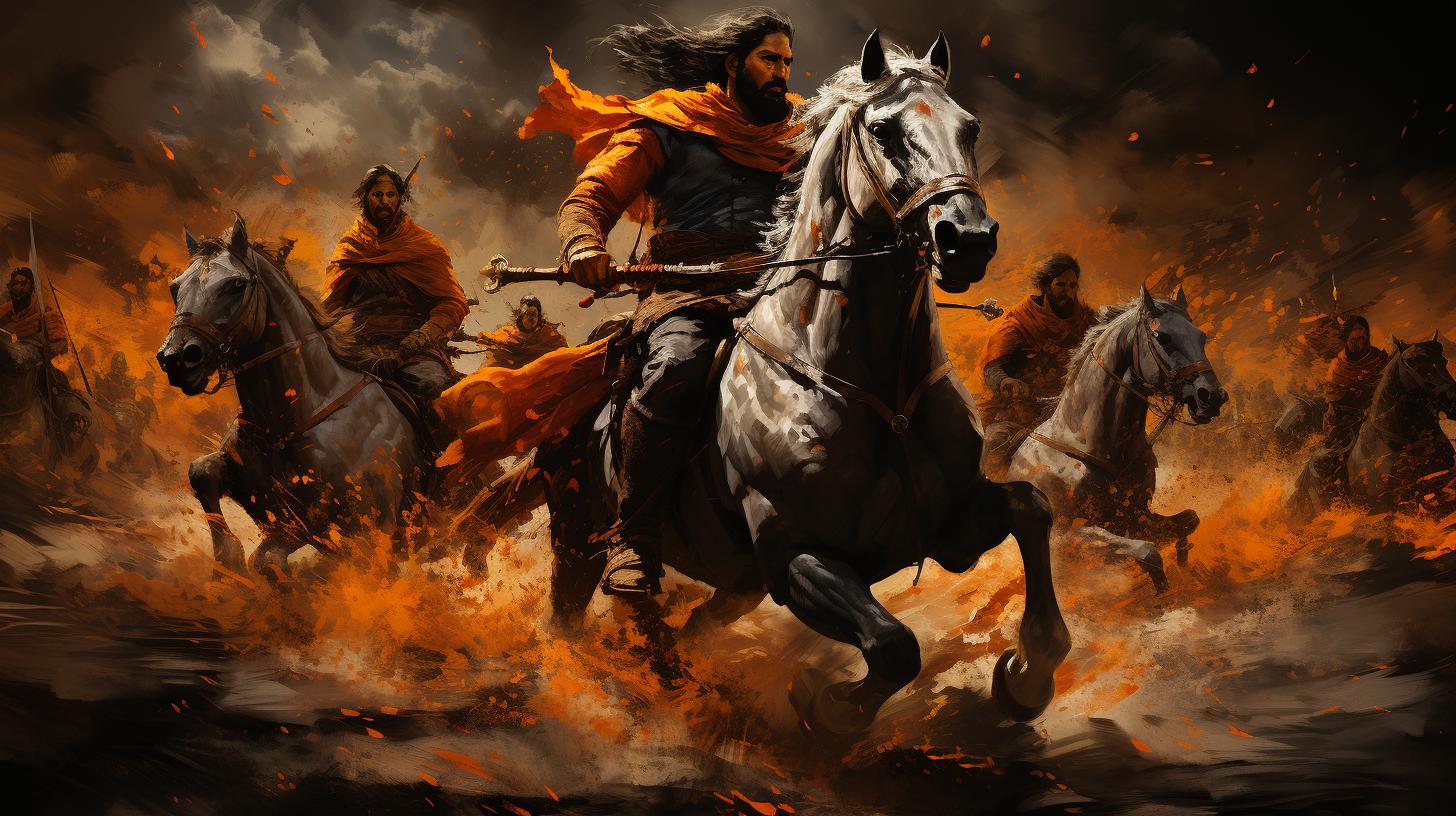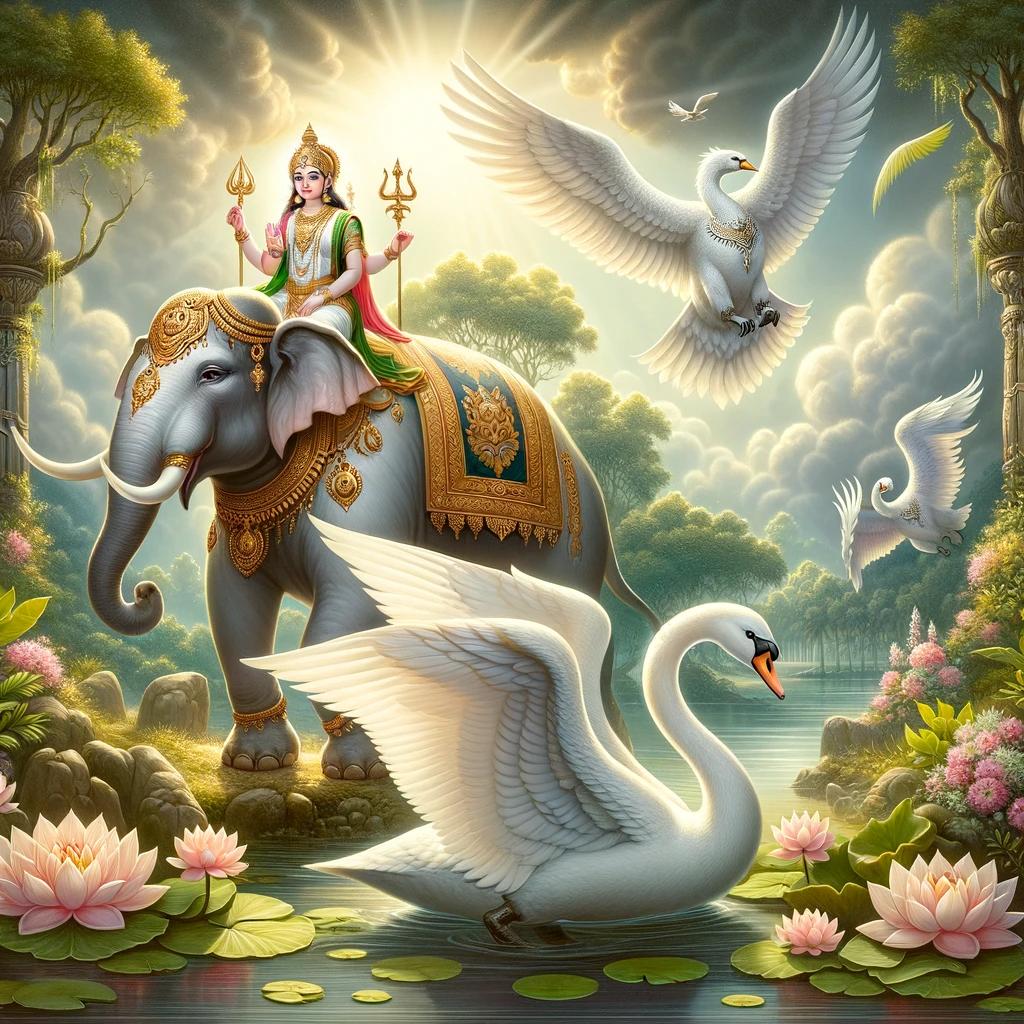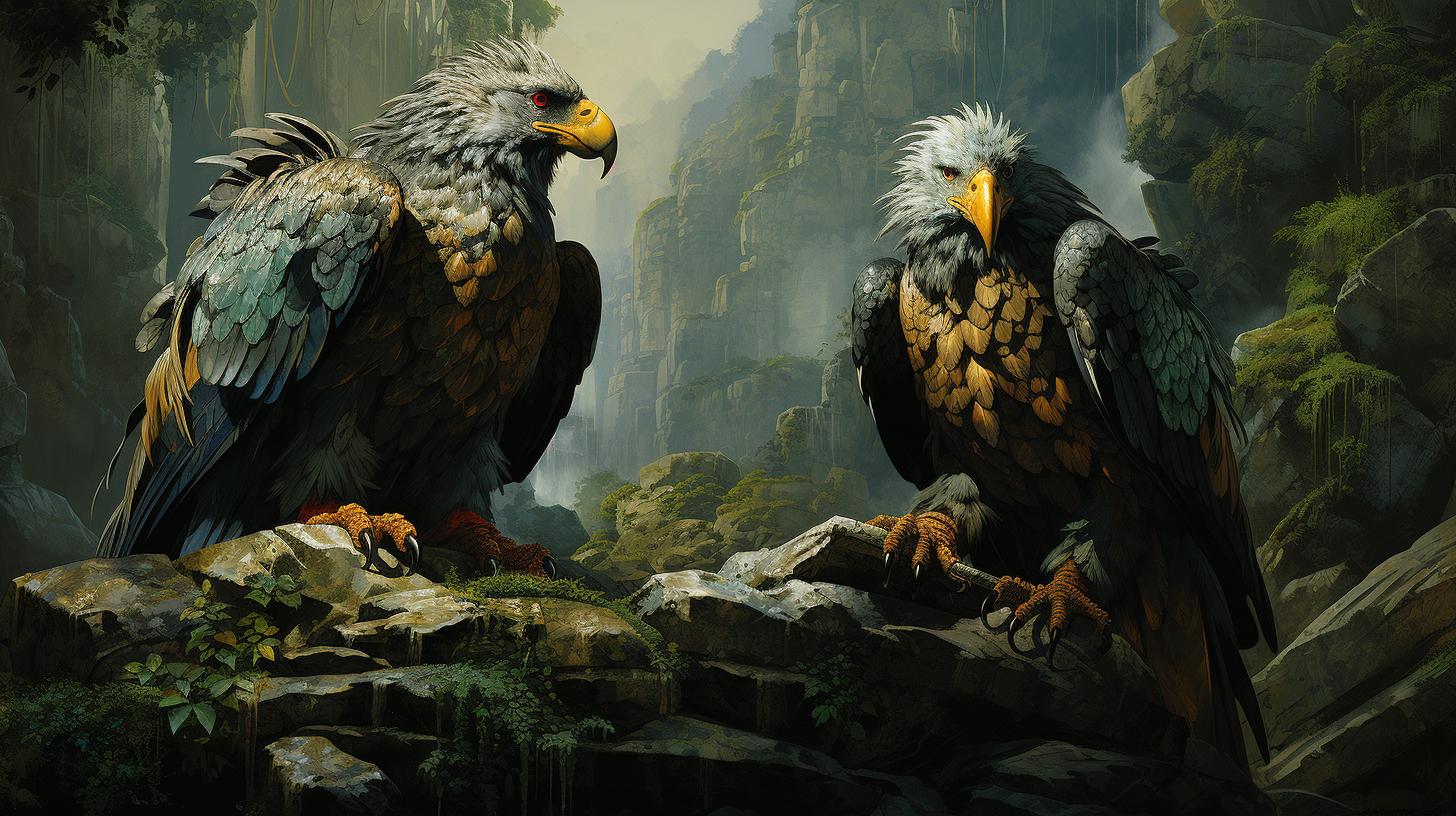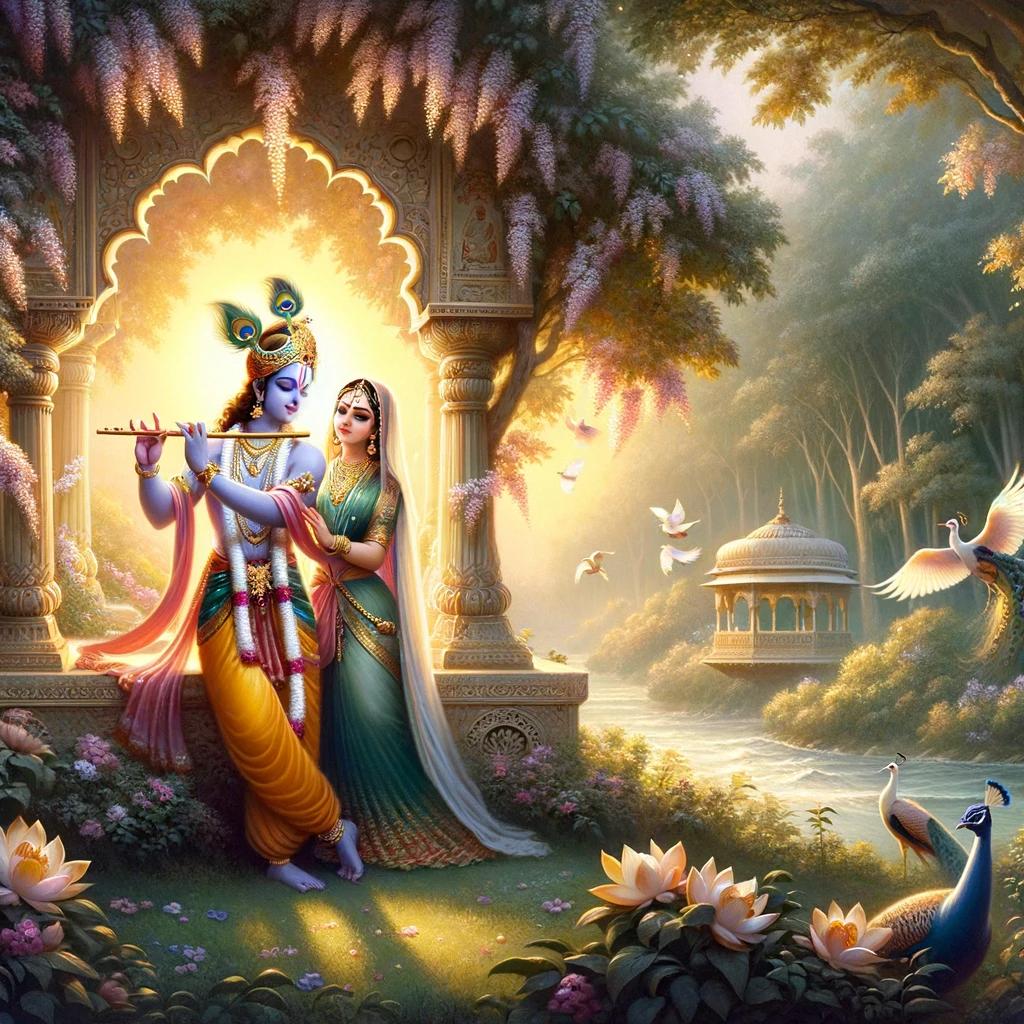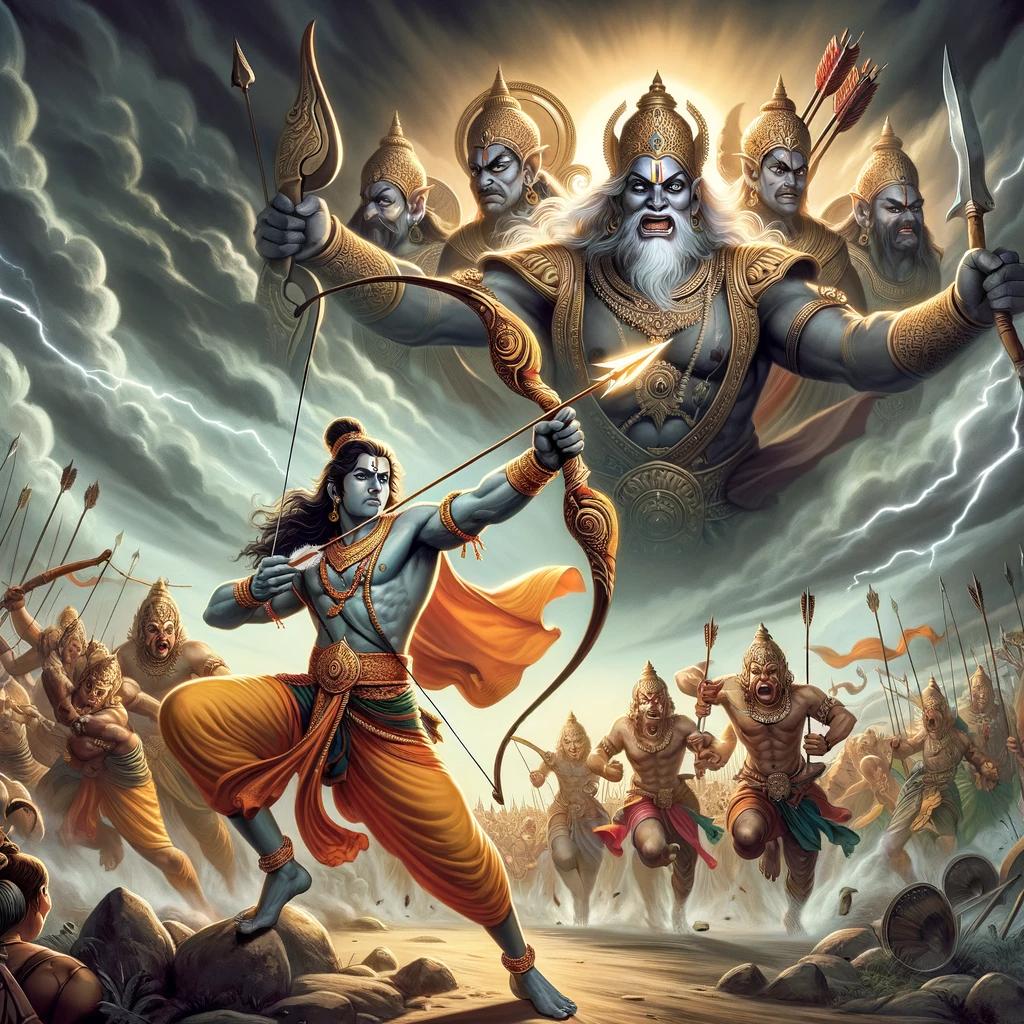Indian Mythology vs. Greek Mythology: A Fascinating Comparison of Ancient Traditions
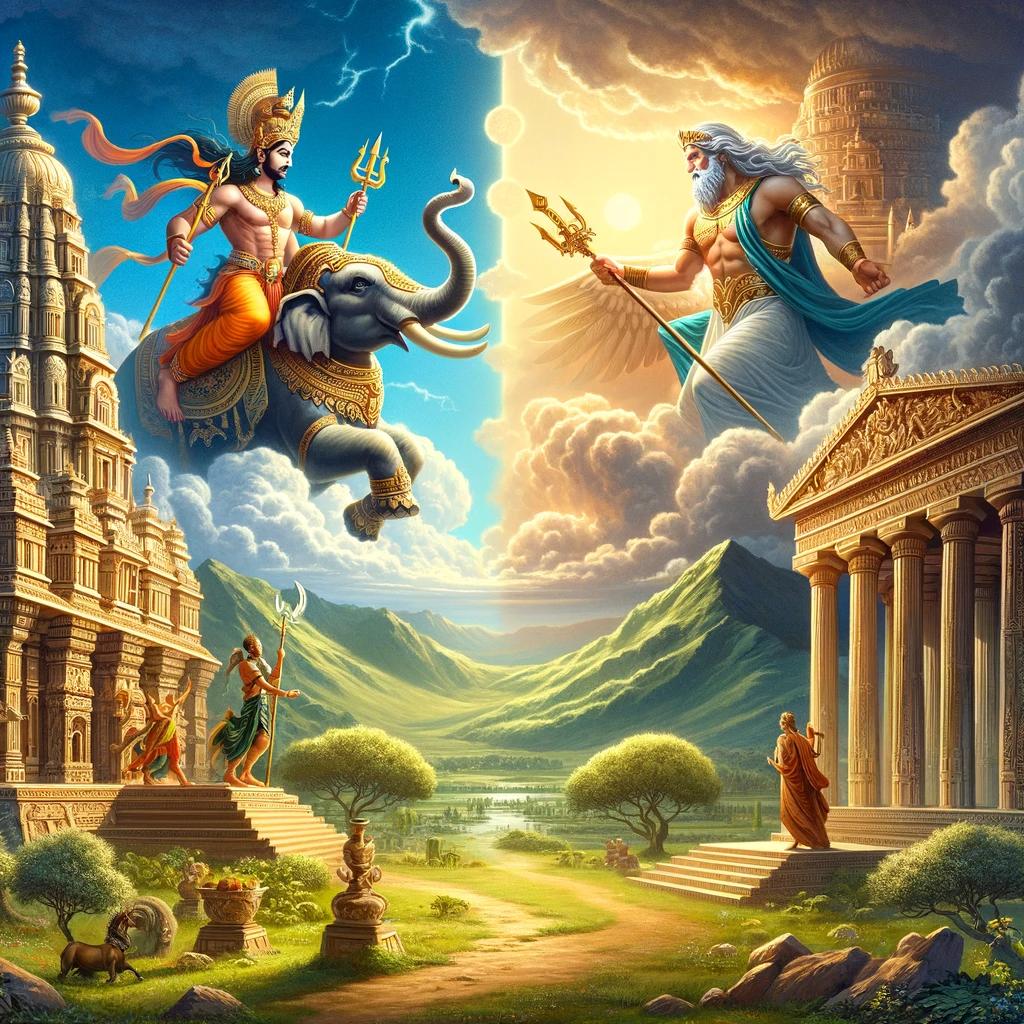
Indian mythology and Greek mythology are ancient traditions that share surprising similarities. They both have deep roots in antiquity and have influenced various aspects of everyday life, from art and literature to religion and philosophy.
This article provides a comparative analysis of these two mythological traditions, exploring their origins, key deities, themes, and cultural influences. We will examine the parallels between creation myths, the roles of supreme deities, heroic themes, and the concepts of the afterlife in Indian and Greek mythology.
Additionally, we will delve into the religious and philosophical impacts of these mythologies.
Origins and Development of Indian Mythology
Indian mythology, with its rich and diverse traditions, has its roots in ancient India and has evolved over centuries. It encompasses a vast array of deities, stories, and philosophical concepts that reflect the religious and cultural beliefs of the Indian subcontinent.
Ancient Indian deities and their significance
Ancient Indian mythology is marked by the worship of numerous gods and goddesses, each representing different aspects of life and nature. These deities, such as Brahma, Vishnu, Shiva, Lakshmi, Saraswati, and Durga, hold immense significance in Hindu mythology.
Brahma, the creator god, is revered as the source of creation and wisdom. Vishnu, the preserver, is believed to maintain balance and protect the universe. Shiva, the destroyer, is associated with transformation and rejuvenation.
Lakshmi is the goddess of wealth and prosperity, while Saraswati is the goddess of knowledge and arts. Durga represents feminine energy and strength.
Influence of Hindu scriptures on Indian mythology
The influence of ancient Hindu scriptures, such as the Vedas and the Upanishads, on Indian mythology is profound.
These texts provide the foundation for many mythical stories, rituals, and philosophical ideas. The Rigveda, for example, contains hymns dedicated to various gods and goddesses, offering insights into their roles and characteristics.
The Puranas, a collection of ancient texts, further elaborate on the genealogies, exploits, and teachings of the gods and heroes in Indian mythology. They narrate stories of creation, the cyclic nature of existence, and the interplay between gods and humans.
The mythology also draws heavily from epic texts like the Ramayana and the Mahabharata, which narrate the heroic deeds and trials of legendary figures like Rama, Krishna, and Arjuna.
These epics explore universal human themes such as duty, morality, love, and the struggle between good and evil.
- Ancient Indian deities hold immense significance in Hindu mythology, representing various aspects of life and nature.
- Hindu scriptures such as the Vedas and the Upanishads have a profound influence on Indian mythology, shaping its stories, rituals, and philosophical concepts.
- The Puranas and epic texts like the Ramayana and the Mahabharata provide detailed accounts of gods, heroes, and their mythological adventures.
Origins and Development of Greek Mythology
The origins and development of Greek mythology have shaped the rich tapestry of ancient Greek culture.
This section explores the key gods and goddesses in Greek mythology and delves into the profound influence of Greek literature and philosophy on these captivating tales.
Key gods and goddesses in Greek mythology
Greek mythology is replete with a diverse pantheon of gods and goddesses, each with their own unique roles and characteristics.
From the mighty Zeus, the king of the gods, to the fearsome Poseidon, the god of the sea, and the enigmatic Hades, the ruler of the underworld, these deities held great significance in the lives of the ancient Greeks.
Other notable gods and goddesses include Athena, Apollo, Artemis, Aphrodite, Hermes, and Hephaestus, amongst many others.
Influence of Greek literature and philosophy on mythology
Greek literature and philosophy played a pivotal role in the development and perpetuation of Greek mythology. Works such as Homer’s epic poems, the Iliad and the Odyssey, served as important sources of mythological narratives, featuring heroes and gods engaged in epic adventures.
The tragedians, such as Aeschylus, Sophocles, and Euripides, further explored the complexities of the divine-human relationship and the consequences of hubris. Additionally, the philosophical ideas of scholars like Plato and Aristotle interpreted mythological concepts, elevating them to realms of moral and existential significance.
- Homeric epics, including the Iliad and the Odyssey, provided a wealth of mythological tales, showcasing the heroic exploits of gods and mortals.
- Tragegers such as Aeschylus, Sophocles, and Euripides delved into the intricate dynamics between gods and humans, exploring themes of fate, moral dilemmas, and the tragic consequences of defying the divine order.
- Philosophers like Plato and Aristotle interpreted Greek mythology to explore ethical, metaphysical, and existential questions, lending a philosophical depth to these ancient stories.
- Greek philosophical ideas, such as Plato’s Allegory of the Cave and Aristotle’s concept of catharsis in tragedy, shed light on the symbolic and psychological dimensions of mythological narratives.
The influence of Greek literature and philosophy on mythology cannot be underestimated, as these creative minds imparted profound insights and enduring interpretations that continue to captivate and inspire to this day.
Similarities between Indian and Greek Mythology
This section explores the remarkable parallels between Indian and Greek mythology, highlighting shared themes and concepts.
Parallels in Creation Myths and the Origins of the Universe
Both Indian and Greek mythology have creation myths that explain the origins of the universe. In Indian mythology, the universe arises from the cosmic egg laid by Brahma, while in Greek mythology, it emerges from the primordial chaos.
In both traditions, the universe undergoes a process of order and organization, with divine beings shaping the world and its inhabitants. These creation narratives reflect a shared belief in the importance of divine intervention and the cyclical nature of cosmic existence.
Comparing Supreme Deities in Indian and Greek Mythology
Indian and Greek mythologies both feature supreme deities who hold immense power and influence over the cosmos.
In Indian mythology, Brahma, Vishnu, and Shiva make up the holy trinity known as the Trimurti, representing creation, preservation, and destruction respectively.
Comparatively, Greek mythology showcases Zeus, Poseidon, and Hades as the ruling trio of the gods, governing sky, sea, and underworld.
These supreme deities display similar attributes and responsibilities, acting as major divine forces in their respective pantheons and interacting with mortal beings.
Themes of Heroism, Prophecy, and Fate in Both Mythologies
Both Indian and Greek mythologies explore themes of heroism, prophecy, and fate, emphasizing the interplay between gods and mortals.
In Indian mythology, heroes like Rama and Arjuna embark on epic quests, facing challenges and fulfilling prophecies.
Similarly, Greek mythology features legendary heroes like Hercules and Perseus, guided by prophetic messages and destined for extraordinary feats.
The idea of fate, woven into the narratives of both mythologies, suggests that the actions and choices of individuals are influenced by divine will or predetermined destiny.
This concept adds depth and complexity to the stories, showcasing the interconnection between gods and humans.
- Parallels in creation myths and the origins of the universe
- Comparing supreme deities in Indian and Greek mythology
- Themes of heroism, prophecy, and fate in both mythologies
Stories and Character Analysis in Indian Mythology
This section explores the captivating tales and character analysis found in Indian mythology.
Two prominent epics, the Ramayana and the Mahabharata, illustrate the rich storytelling tradition and provide insights into the roles of gods and humans.
Epic tales of the Ramayana and the Mahabharata
- The Ramayana: This ancient epic follows the journey of Prince Rama as he embarks on a quest to rescue his wife, Sita, who has been abducted by the demon king Ravana. It showcases themes of honor, devotion, and the battle between good and evil.
- The Mahabharata: This sprawling epic delves into the intricate dynamics of the Kuru dynasty and the conflict between the Pandavas and Kauravas, two sets of cousins battling for the throne.
It explores complex characters, moral dilemmas, and the ultimate triumph of righteousness.
The role of gods and humans in Indian mythology
In Indian mythology, gods and humans often interact closely, shaping destiny and influencing each other’s paths. Humans seek divine guidance and intervention, while gods play significant roles as both protectors and mentors.
- Heroic Figures: Characters like Rama, Arjuna, and Draupadi demonstrate qualities of bravery, righteousness, and resilience, providing moral and ethical examples for human behavior.
- Divine Incarnations: Avatars such as Krishna, an incarnation of Vishnu, walk among humans and guide them in moments of crisis, imparting divine wisdom and enlightening them in their quests.
- Devotion and Worship: Rituals, prayers, and offerings are integral parts of Indian mythology, showcasing the devotion and reverence humans hold for their deities.
By examining these stories and analyzing the roles of gods and humans, we gain insight into the significance of Indian mythology as a means of moral instruction, cultural preservation, and spiritual enlightenment.
Stories and Character Analysis in Greek Mythology
In Greek mythology, the Twelve Olympians play a significant role in shaping the stories and characters of ancient Greece. They are a group of twelve gods and goddesses who reside on Mount Olympus and hold supreme power over various aspects of human life and the natural world.
Each deity has their own unique personality, symbols, and domain, contributing to the rich tapestry of Greek mythology.
The Twelve Olympians and their stories
- Zeus: The king of the gods, Zeus is associated with thunder and lightning. He is known for his numerous affairs with both gods and mortals, which often result in the birth of legendary heroes and demigods.
- Hera: As the queen of the gods and the goddess of marriage and childbirth, Hera is often portrayed as a jealous and vengeful deity.
Her stories involve her tumultuous relationship with Zeus and her pursuit of punishing his numerous infidelities.
- Poseidon: The god of the sea, Poseidon holds power over earthquakes and horses.
He is depicted as a mighty and temperamental deity, capable of causing both destruction and prosperity with his trident.
- Demeter: Demeter is the goddess of agriculture and fertility, responsible for the growth of crops and the changing seasons.
Her most famous story revolves around the abduction of her daughter, Persephone, by Hades, and her relentless search to bring her back.
- Athena: The goddess of wisdom, strategic warfare, and crafts, Athena is considered one of the most respected and revered deities.
She embodies intelligence, courage, and justice, and plays a prominent role in many mythological stories, including the Trojan War.
- Apollo: Apollo is the god of music, poetry, healing, and prophecy.
He is often depicted as an idealized young man, associated with the arts, beauty, and harmony. Apollo’s stories often involve his music, his pursuit of love, and his role as the god of healing.
- Artemis: As the goddess of the hunt, wilderness, and childbirth, Artemis is an untamed deity often associated with the moon.
She is a skilled archer and protector of young women. Stories about Artemis commonly revolve around her hunting expeditions and her aversion to men.
- Ares: Ares is the god of war, commonly depicted as a violent and bloodthirsty deity.
He represents the chaotic and destructive aspects of war, contrasting with Athena’s strategic approach. Ares’ stories involve his involvement in battles and conflicts among the gods and mortals.
- Hephaestus: Hephaestus is the god of fire, blacksmiths, and craftsmanship.
He is known for his exceptional skill in forging weapons and jewelry. Hephaestus holds a unique position among the gods due to his physical deformities, which become an important aspect of his stories.
- Aphrodite: Aphrodite is the goddess of love, beauty, and desire.
Her stories often revolve around her romantic and passionate encounters with both gods and mortals. Aphrodite’s beauty and allure influence the lives of many characters in Greek mythology.
- Hermes: As the messenger of the gods, Hermes possesses great speed, intelligence, and cunning.
He plays a central role in many mythological stories, delivering messages, guiding souls to the afterlife, and assisting gods and mortals in various quests.
- Dionysus: Dionysus is the god of wine, festivities, and ecstasy.
He represents the uninhibited and wild aspects of human nature. Dionysus’ stories often involve celebrations, madness, and transformation, symbolizing the power of revelry and emotional release.
Tragic heroes and their interactions with deities
Greek mythology is famous for its tragic heroes, individuals who possess extraordinary qualities but ultimately meet a tragic fate.
These heroes often interact with the gods, either as allies or adversaries, shaping their destinies and the world around them.
One of the most renowned tragic heroes is Heracles, known as Hercules in Roman mythology.
His incredible strength and bravery are tested through a series of labors imposed on him by the gods as punishment for his past actions. Heracles’ stories showcase his struggles, triumphs, and eventual ascension to godhood.
Another tragic hero is Perseus, who embarks on a perilous quest to slay the monstrous Gorgon Medusa. With the help of the gods, Perseus overcomes numerous challenges and uses Medusa’s severed head as a powerful weapon.
His story exemplifies the hero’s journey and the influence of deities in shaping the outcome.
Oedipus, the subject of the famous tragedy by Sophocles, is another notable tragic hero in Greek mythology.
He unknowingly fulfills a prophecy that he would kill his father and marry his mother. His story explores themes of fate, free will, and the consequences of defying the gods.
These tragic heroes reflect the complex and intricate relationship between mortals and gods in Greek mythology.
The gods often meddle in the lives of heroes, both aiding and challenging them, leading to their ultimate triumphs or downfalls.
The Underworld in Indian and Greek Mythology
In Indian mythology, the concept of the afterlife and judgment is deeply rooted in Hindu beliefs. According to Hindu scriptures, after death, the soul undergoes a journey through various realms, including Heaven, Hell, and the realm of ancestors.
The ultimate goal is to achieve Moksha, the liberation from the cycle of rebirth.
On the other hand, in Greek mythology, the realm of the Underworld is known as Hades. It is ruled by the god Hades, and it serves as the final destination for souls after death.
The Underworld is a vast and complex realm with different sections, such as the Elysian Fields for the virtuous souls and Tartarus for the wicked.
Concepts of the Afterlife and Judgment in Indian Mythology
In Indian mythology, the afterlife destinations are determined by one’s karma, actions, and the performance of religious rituals in their earthly life.
The soul is believed to face judgment by the god of death, Yama, who examines the balance of good and bad deeds to determine the soul’s fate. Those who have led a righteous life are rewarded with heavenly realms, while those with negative karma may be subjected to punishment or reincarnation.
The Realm of Hades and its Significance in Greek Mythology
The realm of Hades plays a crucial role in Greek mythology. It is depicted as a gloomy and somber place where the shades of the dead reside. The souls undergo judgment upon reaching the Underworld, where their actions in life are weighed and their eternal fate is determined.
While some are granted a peaceful existence in the Elysian Fields, others face various punishments in Tartarus for their wrongdoings.
Hades himself is a complex figure, not purely malevolent but rather a stern ruler with a sense of justice.
The Underworld serves as a reminder of mortality and the consequences of one’s actions in the mortal realm.
Overall, the concepts of the afterlife and judgment in Indian and Greek mythologies offer distinct visions of what awaits humans beyond death.
While Indian mythology focuses on the cycle of reincarnation and achieving spiritual liberation, Greek mythology emphasizes the realm of Hades as the final destination for souls and the necessity of judgment for one’s actions in life.
Holy Trinity in Indian and Greek Mythology
In this section, we will delve into the concept of the holy trinity in both Indian and Greek mythology, exploring the divine trios that hold significant roles in their respective mythological traditions.
These trinities embody the fundamental aspects of the pantheon and play a crucial role in shaping the mythology of each culture.
Understanding the trinity of Brahma, Vishnu, and Shiva in Hinduism
Hindu mythology features a trinity known as the Trimurti, consisting of Brahma, Vishnu, and Shiva. Brahma is the creator deity, responsible for the creation and maintenance of the universe.
Vishnu is the preserver, ensuring harmony and order in the world. Shiva is the destroyer and transformer, representing the cyclical nature of existence.
Each deity in the Hindu trinity has a distinct role and attributes.
Brahma is depicted with four heads and is associated with knowledge and creativity. Vishnu is worshipped in various forms, such as Rama and Krishna, and is known for restoring balance and righteousness.
Shiva is often depicted as a meditating yogi with a trident, symbolizing his control over the forces of creation, preservation, and destruction.
Examining the roles of Zeus, Poseidon, and Hades in Greek mythology
Greek mythology also presents a trinity of gods with Zeus, Poseidon, and Hades taking central roles.
Zeus is the king of the gods, ruling over the heavens and wielding thunderbolts. As the god of the sky and weather, he represents power and authority.
Poseidon is the god of the sea, controlling the oceans and all aquatic phenomena.
His trident is his iconic symbol, representing his authority over the waters and his ability to cause both calmness and storms. Hades, the god of the underworld, rules over the realm of the dead and the afterlife.
Each member of the Greek trinity possesses distinct qualities and domains. Zeus symbolizes leadership and justice, while Poseidon represents the forces of nature and the power of the seas.
Hades, in contrast, oversees the realm of the dead, embodying the mysteries of the afterlife and the concept of finality.
Comparative Analysis of Religious and Philosophical Influences
Impact of Indian mythology on Hindu religious practices and beliefs
Indian mythology has had a profound impact on Hindu religious practices and beliefs. The rich pantheon of Hindu gods and goddesses that are worshipped and revered today find their origins in the ancient myths and legends.
These myths not only provide narratives for devotion and worship but also offer moral and spiritual guidance to followers. The ancient texts such as the Vedas, Upanishads, and Puranas serve as important sources for the stories and teachings that shape Hindu rituals and traditions.
The epics of the Ramayana and the Mahabharata, for instance, continue to inspire devotion and serve as moral compasses for millions of Hindus.
Influence of Greek mythology on ancient Greek religion and philosophy
Greek mythology played a significant role in shaping ancient Greek religion and philosophy. The gods and goddesses of Greek mythology were not only worshipped but also seen as metaphors for human experiences, emotions, and virtues.
The myths offered explanations for natural phenomena, moral dilemmas, and the human condition. The religious rituals and festivals dedicated to the gods were an integral part of ancient Greek society, fostering a sense of collective identity and reinforcing communal values.
Greek philosophers, such as Plato and Aristotle, drew on these mythological narratives to articulate their philosophical ideas and theories on ethics, metaphysics, and the nature of reality.
Conclusion
The comparative analysis of the religious and philosophical influences of Indian mythology and Greek mythology reveals the profound impact these ancient traditions had on their respective cultures. Indian mythology, deeply rooted in Hinduism, continues to shape religious practices and beliefs, providing guidance and inspiration to millions.
Greek mythology, with its rich pantheon of gods and complex narratives, influenced not only ancient Greek religion but also laid the foundation for philosophical concepts and ideas that permeated Western thought.
Exploring these influences provides insights into the human quest for meaning, understanding, and the search for transcendence.
.











